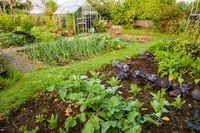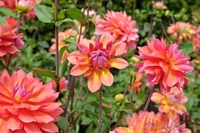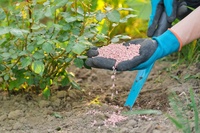
Ever wondered what the secret to healthy soil is? It is much easier to achieve than you think, no matter what type of soil you are starting with. With some knowledge and a little work, you can turn your soil into a thriving ecosystem that keeps your plants happy and helps create a biodiverse garden that wildlife will adore. The soil beneath your feet is a world of microorganisms that is full of life. We need good soil to grow plants and trees, so getting to know your soil is a positive step towards a thriving garden and planet.
What Is Healthy Soil?
- If you want to create healthy soil, here's what you should look out for:
- You will be looking for soil with good texture.
- It will be crumbly and not too sandy and dry or not too clumpy and wet.
- It won't be full of stones, and it will feel easy to work in your hands.
- It will be rich in colour and nutrients. Ideally, it will be able to hold nutrients and be well drained.
- You may also want to check the pH of your soil to know which plants will be best suited to plant in your alkaline, neutral, or acidic soil.
No Dig Gardening
This gardening method means you never dig the soil (unless it's to harvest gently), allowing nature to do what it does best with a helping hand of mulch from you. Working the ground can damage the structure, so applying mulch to the surface and allowing the weather and the worms to incorporate it means less back-aching work for you and all the better for the soil. No dig gardening has been shown to improve soil significantly.
No Use of Chemicals
When we apply chemicals to a natural environment, we alter the natural state of the soil, plants, and wildlife. Many chemicals can be highly damaging to your soil, which can cause problems for years. Ditch the chemicals and work with natural products.
Mulching
Adding lots of organic matter to your soil will enrich it to improve the texture, nutrient, and moisture levels, resulting in better soil and healthier plants. Microorganisms in the soil will break down the organic matter for plants to absorb. There are many different types you can use, from horse manure to mushroom compost, plant-based composts, bark and woodchip to your own homemade compost - which, if you are patient and get a good balance of green and brown waste in, will be the cheapest and best for your soil.
Visit us to find out how to improve your soil with our range of soil improvers.




